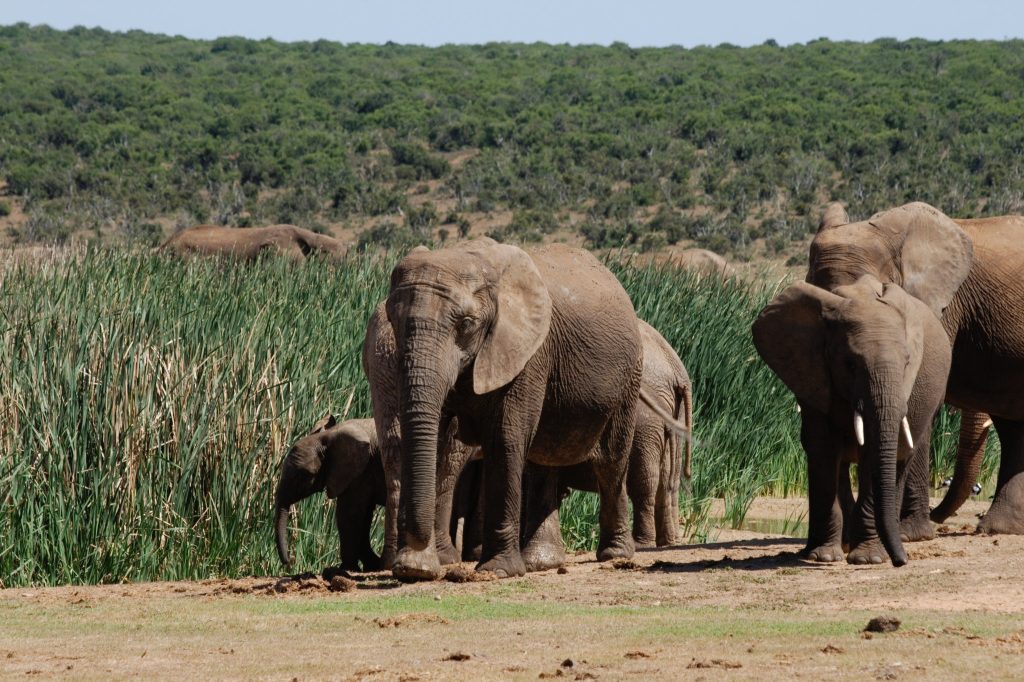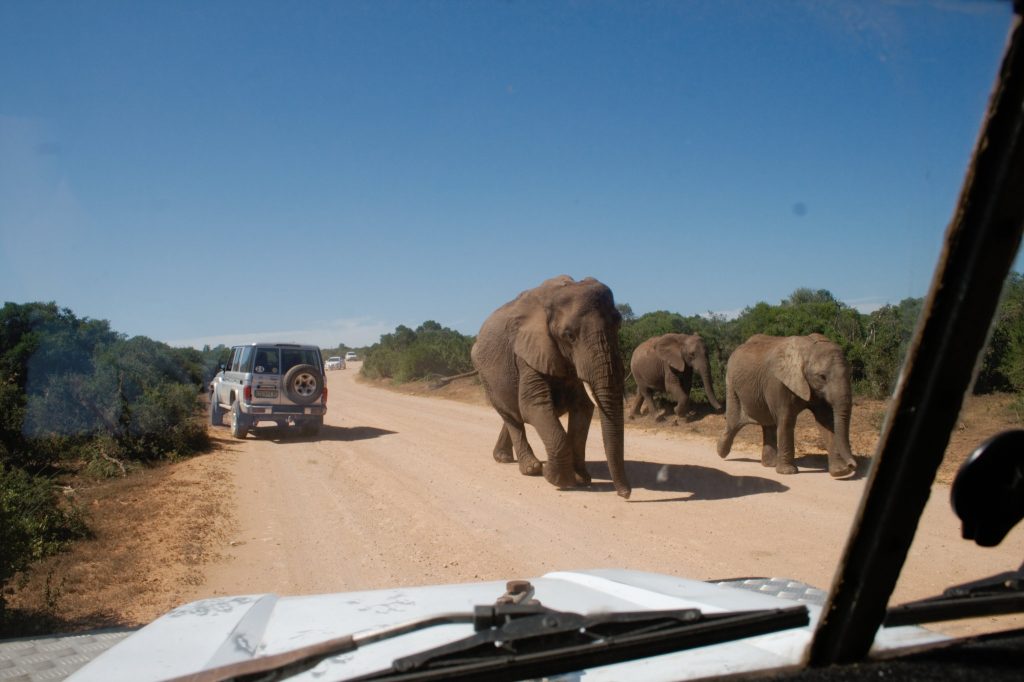Addo Elephant National Park
Addo Elephant National Park: A Sanctuary for African Wildlife
Introduction
Nestled in the Eastern Cape of South Africa, the Addo Elephant National Park is a wildlife conservation haven that serves as a refuge for a diverse range of African animals and ecosystems. Established in 1931 to protect the remaining 11 elephants in the area, it has since expanded its boundaries and become a thriving national park. This comprehensive article delves into the history, ecology, conservation efforts, and visitor experience of the Addo Elephant National Park, celebrating its role in safeguarding African wildlife.

1. Historical Overview
1.1 Origins of the Park
The creation of the Addo Elephant National Park was initiated by Sydney Skaife, the park’s first warden, in response to the devastating decline in the elephant population in the region. By 1931, due to extensive hunting and habitat destruction, only 11 elephants remained in the Addo area. To prevent the local extinction of these majestic creatures, the park was established. Today, the Addo Elephant National Park boasts a population of over 600 elephants, making it one of the most significant populations in Africa.
1.2 Expansion and Development
Over the years, the park has seen substantial expansion, not only to protect the elephants but also to conserve a wide range of other species and ecosystems. In 1954, the park was extended to include the marine area off the coast of Algoa Bay. The park’s boundaries have continued to expand, and today it covers an area of more than 180,000 hectares.
1.3 Addition of the Big Five
One of the park’s notable achievements is its successful reintroduction of iconic species known as the “Big Five” – elephants, lions, leopards, rhinoceroses, and buffalos. These animals had been extirpated from the region due to hunting and habitat loss. Through conservation efforts and reintroduction programs, they now thrive within the park’s boundaries, offering visitors a chance to witness these magnificent creatures in their natural habitat.

2. Ecological Significance
2.1 Diverse Ecosystems
The Addo Elephant National Park showcases a variety of ecosystems, ranging from dense thickets and forested areas to open grasslands. This diversity of habitats supports a rich assortment of flora and fauna. The park’s vegetation zones include fynbos, succulent thicket, and forest, and it is home to over 400 bird species, as well as numerous mammals, reptiles, and invertebrates.
2.2 Thicket Biome
The park is renowned for its dense spekboom (Portulacaria afra) thickets, which are unique to the Eastern Cape. The spekboom plant, known for its carbon-sequestering properties, is an essential component of the ecosystem and a primary food source for elephants and other herbivores in the park.
2.3 Conservation of Endangered Species
Addo Elephant National Park plays a crucial role in the conservation of endangered species. It is home to populations of the endangered black rhinoceros and Cape mountain zebra, among other vulnerable species. The park’s management is actively involved in breeding and reintroduction programs aimed at increasing the populations of these threatened animals.
3. Conservation Efforts
3.1 Elephant Management
The park’s management has developed a comprehensive elephant management plan to address the challenges posed by the high elephant population, including habitat degradation and conflicts with neighboring communities. This plan involves the translocation of some elephants to other protected areas and the use of contraception to control population growth. These measures ensure the park’s ecological balance while securing the future of the elephants.
3.2 Community Involvement
Addo Elephant National Park is committed to fostering good relations with the surrounding communities. Collaborative efforts include employment opportunities, educational programs, and community-based tourism initiatives. These endeavors not only benefit the local communities but also contribute to the park’s long-term sustainability and success.
3.3 Anti-Poaching Initiatives
To protect its wildlife from poaching, the park employs a dedicated team of anti-poaching rangers who work tirelessly to safeguard the rhinoceros and other endangered species. Their efforts, combined with partnerships with local law enforcement agencies, have significantly reduced poaching incidents in the park.
4. Visitor Experience
4.1 Game Drives
A visit to the Addo Elephant National Park offers a unique opportunity to embark on game drives that allow visitors to observe the park’s diverse wildlife. Professional guides lead these excursions, providing insights into the behavior and ecology of the animals. It is a thrilling experience to encounter elephants, lions, and other animals in their natural habitat.
4.2 Self-Drive Safaris
The park is known for its excellent infrastructure, making it possible for visitors to enjoy self-drive safaris. Well-maintained roads, strategically placed waterholes, and viewpoints ensure that you have the chance to see animals in their natural settings. It’s a fantastic way to explore the park at your own pace.
4.3 Birdwatching
With its remarkable diversity of bird species, Addo Elephant National Park is a haven for birdwatching enthusiasts. The park’s various habitats offer excellent birdwatching opportunities, and birders can spot a wide range of species, from raptors to waterfowl.
4.4 Hiking Trails
For those interested in exploring the park on foot, there are several hiking trails, such as the Alexandria Hiking Trail and the Zuurberg Mountain Village Trails. These trails allow hikers to immerse themselves in the park’s natural beauty and observe the smaller flora and fauna that may be missed on a traditional game drive.
5. Accommodations and Facilities
The park offers a variety of accommodations to suit different preferences, ranging from rest camps and tented camps to luxury lodges. Additionally, there are picnic sites, viewpoints, and visitor centers that provide educational resources and information about the park’s wildlife and conservation efforts.
6. Conclusion
Addo Elephant National Park stands as a testament to the success of conservation efforts and the resilience of African wildlife. From its humble origins as an elephant sanctuary, the park has grown into a thriving and diverse ecosystem. It serves as a model for sustainable wildlife management and community involvement, offering visitors the chance to connect with the natural world and experience the majesty of African wildlife in a protected and unspoiled setting.
As a sanctuary for elephants, lions, rhinoceroses, and other species, the park plays a vital role in preserving the biodiversity of the Eastern Cape. Its blend of ecological significance, conservation efforts, and visitor experiences makes Addo Elephant National Park a must-visit destination for wildlife enthusiasts, nature lovers, and all who appreciate the beauty and importance of preserving Africa’s natural heritage.
Accomodation:
Find Accomodation in Colchester
Addo Elephant National Park offers a range of accommodation options to suit different budgets and preferences. The park has several rest camps and lodges located in different areas of the park, each offering a unique experience.
- Main Rest Camp: This is the largest rest camp in the park and offers a range of accommodation options, including chalets, rondavels, safari tents, and campsites. There is a restaurant, a shop, a swimming pool, and a picnic area within the camp.
- Matyholweni Rest Camp: This rest camp is located near the park’s southern entrance and offers chalets, family cottages, and campsites. There is a swimming pool, a restaurant, and a shop within the camp.
- Narina Bush Camp: This camp is a secluded, eco-friendly camp located in a remote part of the park. It offers tented accommodation, each with its own bathroom and outdoor shower. The camp has a communal kitchen and dining area.
- Spekboom Tented Rest Camp: This is a relatively new camp in the park that offers eco-friendly tented accommodation with en-suite bathrooms. The camp is situated in a remote part of the park and offers a unique wilderness experience.
- Luxury Lodges: The park also has several luxury lodges, such as the Gorah Elephant Camp and the Kuzuko Lodge, which offer luxurious accommodation and safari experiences.
It is recommended to book accommodation in advance, especially during peak season, to secure your preferred option.
Other options are:
Accomodation in Addo outside the Park: